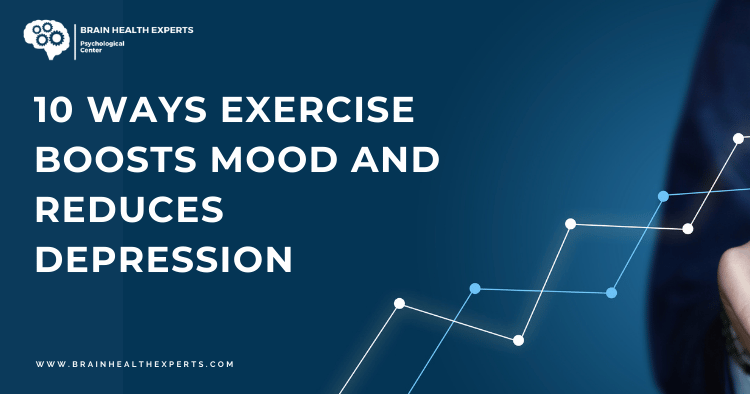Table of Contents
- Introduction
- Release of Endorphins
- Improved Sleep Quality
- Increased Social Interaction
- Boosted Self-Esteem
- Distraction from Negative Thoughts
- Routine and Structure
- Mindfulness and Presence
- Physical Health Benefits
- Long-term Resilience
- Conclusion
Introduction
Exercise is often touted as a miracle cure for a multitude of ailments, and when it comes to mental health, its benefits are hard to ignore. Numerous studies have shown that physical activity can be a powerful tool in reducing symptoms of depression and improving overall mood. In this blog post, we will explore ten ways that exercise can uplift your spirits and contribute to a healthier mind.
1. Release of Endorphins
One of the most well-known effects of exercise is the release of endorphins, often referred to as “feel-good” hormones. When you engage in physical activity, your brain releases these chemicals, which can create a sense of euphoria and reduce pain perception. This phenomenon is often called the “runner’s high,” but you don’t need to run marathons to experience it. Even short bursts of exercise, like a brisk walk or a dance session, can trigger this response.
Key Points:
- Endorphins interact with the receptors in your brain, reducing the perception of pain and triggering positive feelings.
- Regular exercise can increase the resting levels of endorphins, leading to a more sustained uplift in mood.
For more on the science behind endorphins, check out this Harvard Health article.
2. Improved Sleep Quality
Struggling with sleep issues? Exercise may be the answer. Engaging in regular physical activity has been shown to improve sleep quality, helping you fall asleep faster and enter deeper sleep stages. Quality sleep is vital for mental health, as it allows your brain to recover and rejuvenate.
Key Points:
- Exercise increases the amount of slow-wave sleep (deep sleep), which is critical for physical and mental restoration.
- Aim to finish exercising a few hours before bedtime to avoid sleep disruption.
Learn more about the connection between sleep and exercise in this American Psychological Association article.
3. Increased Social Interaction
Exercise often provides opportunities for social interaction, whether through group classes, sports teams, or simply walking with a friend. Socializing can significantly decrease feelings of isolation and loneliness, which are often associated with depression.
Key Points:
- Engaging in group activities can foster a sense of community and belonging.
- Building friendships through exercise can provide emotional support and encouragement.
For tips on how to socialize through exercise, check out this NAMI resource.
4. Boosted Self-Esteem
Regular exercise can lead to improvements in physical appearance and fitness levels, which can boost self-esteem and confidence. Feeling good about your body can help combat negative self-image, a common symptom of depression.
Key Points:
- Setting and achieving fitness goals can provide a sense of accomplishment.
- Positive changes in body image can enhance overall mental well-being.
Explore the relationship between self-esteem and exercise in this Psychology Today article.
5. Distraction from Negative Thoughts
Exercise serves as a healthy distraction from the cycle of negative thoughts that can accompany depression. Engaging in physical activity can help redirect your focus, allowing you to take a break from rumination and stress.
Key Points:
- Physical activity can provide a mental break, allowing for clarity and peace.
- The rhythmic nature of many forms of exercise can be meditative, further aiding in distraction.
For more insights on this topic, visit Verywell Mind.
6. Routine and Structure
Establishing a routine can be especially beneficial for individuals dealing with depression. Regular exercise can provide a sense of structure to your day, making it easier to manage tasks and responsibilities.
Key Points:
- Consistency in exercise can help create a sense of normalcy.
- Having scheduled workout times can reduce procrastination and increase motivation.
Learn more about the importance of routine in managing depression from the Mayo Clinic.
7. Mindfulness and Presence
Many forms of exercise promote mindfulness, requiring you to focus on your body and breath. This focus can help ground you in the present moment, alleviating feelings of anxiety and depressive thoughts.
Key Points:
- Practices like yoga and tai chi are particularly effective for promoting mindfulness.
- Mindful movement can enhance emotional regulation and reduce stress.
Explore mindfulness in exercise further with this Mindful article.
8. Physical Health Benefits
Regular exercise is not just good for your mental health; it also improves your physical health. A healthier body can lead to a healthier mind. Reduced risk of chronic diseases, improved cardiovascular health, and better immune function all contribute to an enhanced sense of well-being.
Key Points:
- Regular physical activity can lower blood pressure, improve cholesterol levels, and stabilize blood sugar.
- Feeling physically healthier can contribute to a more positive mindset.
To read more about the physical benefits of exercise, check out the CDC’s physical activity guidelines.
9. Long-term Resilience
By incorporating exercise into your routine, you build resilience against future bouts of depression. The coping mechanisms developed through regular physical activity can help you manage stress and navigate life’s challenges more effectively.
Key Points:
- Exercise can provide valuable skills such as discipline, perseverance, and stress management.
- Building resilience can lead to improved coping strategies in mental health crises.
Discover more about resilience and mental health in this Mental Health America article.
Conclusion
Exercise is a powerful tool in the fight against depression, offering numerous benefits that extend beyond the physical. Whether it’s the release of endorphins, improved sleep quality, or enhanced social connections, the reasons to incorporate exercise into your daily routine are compelling. If you’re feeling down or struggling with depression, consider making physical activity a part of your self-care strategy. Remember, every little bit counts, and you don’t have to go it alone. Grab a friend, join a class, or simply step outside for some fresh air—you might just find that moving your body can lift your spirits in ways you never expected.
Also look for more insights on the power of positive thinking and its effects on mental health in articles such as 10 Ways Positive Thinking Boosts Emotional Well-Being and 10 Proven Techniques to Boost Your Self-Esteem Today. These resources can provide further strategies to enhance your mental well-being through positivity and self-empowerment.
Feel free to reach out if you have any questions or need further information on how to get started with exercise and improve your mental well-being!





